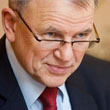news
Mr. Vytenis Povilas Andriukaitis
Minister of Health of the Republic of Lithuania
Co-chair Session I of the conference: ‘Sustainable health systems: visions and strategies’, contribute to the panel discussion and round off the closing plenary.
November 2013
Sustainable Health Systems for Inclusive Growth in Europe
The challenge of creating sustainable healthcare systems is very important not only for Lithuania, but for the whole of the European Union. The theme also has a wider resonance for the whole world, believes Vytenis Povilas Andriukaitis, Minister of Health of the Republic of Lithuania.
Through the vision of building sustainable health systems it will be possible to confront some of the shifts and changes that are motion, such as the ageing of the population and the increasing incidence of chronic disease to make coherent decisions to improve the health and well-being of people living in Europe. “We must concentrate on this very concrete topic,” says Mr Andriukaitis.
In adopting Sustainable Health Systems as the theme of the conference, the Lithuanian Health Ministry is building on other meetings and discussions taking place during the presidency, including the European Health Forum meeting in Gastein, Austria from October 2 - 4, which addressed the issue of ‘Resilient and Innovative Health Systems for Europe’; the October 8 – 9 meeting of the Council of the Working Party on Public Health; the European Public Health Alliance, a conference held under the auspices of the Lithuanian Presidency in Brussels on September 4 -5; and an informal meeting of EU ministers for health, which took place in Vilnius on July 8 – 9.
“We have discussed sustainability of healthcare in other conferences, and looking to the European Union Health Council in December, we need to come up with concrete proposals from stakeholders,” says Mr Andriukaitis. The outcomes of the Vilnius conference on 19 – 20 November will be summarised and combined with the conclusions of the other events in a single document, and be taken forward to the European Council meeting.
This is the first time that Lithuania has held the Presidency of the European Union, and Mr Andriukaitis believes the outcomes of the debate about healthcare sustainability will have a positive impact on the country’s healthcare system in the future. “The core ideas are to take an integrated approach to healthcare system management,” he says.
At present, Lithuania has a discontinuity in the landscape of its healthcare systems from primary care at one end to university hospitals at the other. “We need to look at how we can better deal with financial management, pathology, human resources, and how to connect all the actors,” said Mr Andriukaitis.
“We have distinct areas in primary healthcare, district and university hospitals, we need to combine them in one integrated model.” The aim is to create “integrated, efficient, healthcare clusters,” Mr Andriukaitis said.
Healthcare and its role in the economy
Lithuania presents a role model for how healthcare can be used to drive economic growth, believes Mr Andriukaitis. The country has leading hospitals with a high level of technology adoption and a highly educated workforce. It is an important source of employment and is very competitive compared to other sectors.
“There is the possibility to create new jobs, [develop] new technologies, and involve scientists, involve society, in a rapidly developing economic sector,” Mr Andriukaitis said.
Regional collaboration, between fellow Baltic states of Estonia and Latvia, and with Poland, is central to this vision. “The answer is very simple: we need cooperation,” Mr Andriukaitis said. This will be underpinned by the EU Directive on Patients’ Rights in Cross-Border Healthcare which seeks to enable patients to receive treatment in another Member State.
“We see the possibility to create centres of excellence and of course to cooperate with Estonia, Latvia, and Poland,” Mr Andriukaitis said. Vilnius will be a centre of excellence in cardiac surgery and oncology, Kaunas in neurosurgery. “There is a good opportunity to cooperate together with the three Baltic States and Poland.”
This commitment to cooperation is reflected in the broad base of stakeholders that the Lithuanian Presidency will be pulling together at the conference in Vilnius. As Mr Andriukaitis says, “You can’t get on today without collaborations.” This applies as much at a cross-border level as it does within the specialisms and different levels in healthcare systems.
“You can’t have separate actors: the conference aims to connect different stakeholders to discuss common problems and come up with common possibilities [for reforms],” Mr Andriukaitis said. “Industry, healthcare providers, NGOs, economists and so on, need common themes to move forward together and develop a multi-sectoral approach; it’s the only way.”
The European Union’s ambition - as set out in the Health 2020 policy framework – is to support action across government and society to significantly improve the health and well-being of populations, reduce health inequalities, strengthen public health and ensure people-centred health systems that are universal, equitable, sustainable and of high quality.
It will be impossible to deliver on this vision, “Without pulling everyone together in high-level conferences such as this, in which there is a good opportunity to exchange our views,” Mr Andriukaitis concluded.

